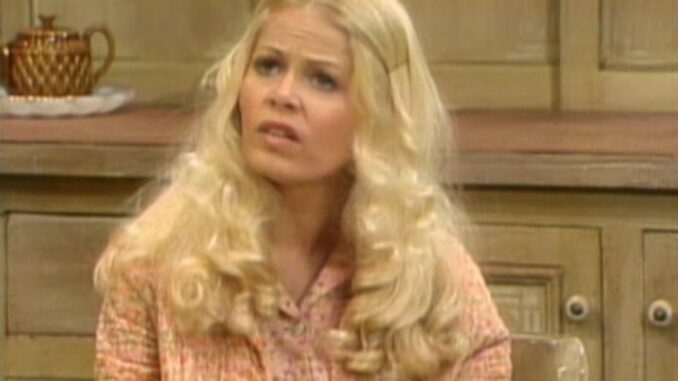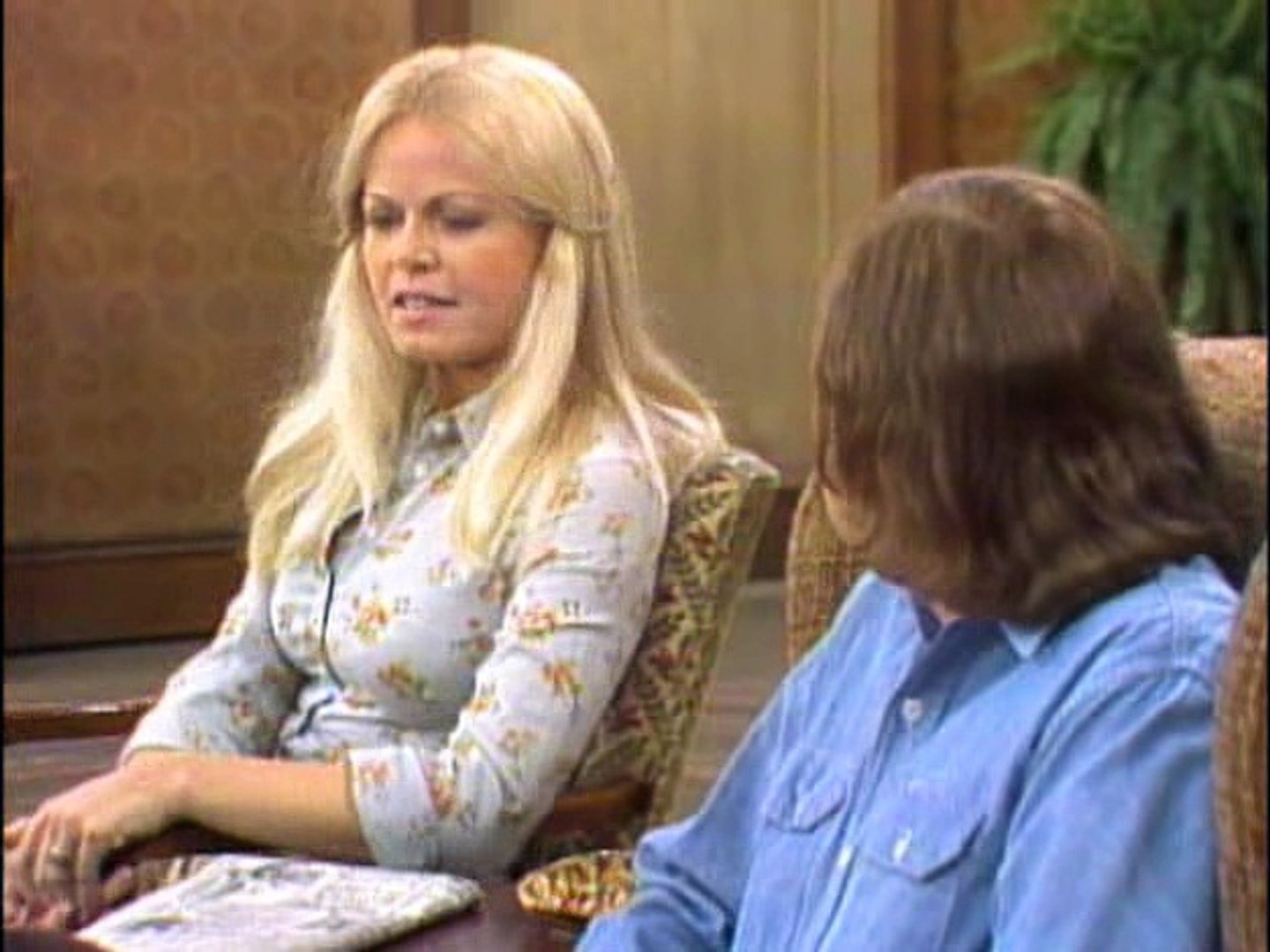
 The “All in the Family” episode “Archie’s Brief Encounter” initially aired as a one-hour special, as it dealt with some pretty heavy subject matter. Notably, it was the episode wherein it looked like Edith Bunker (Jean Stapleton) was going to leave her husband Archie (Carroll O’Connor) once and for all. Archie loves Edith, of course, but he has a selfish streak a mile wide, along with many, many other character flaws that require a lot of patience to withstand (although O’Connor himself was a stalwart union man). After its first airing, “Brief Encounter” was presented in two parts.
The “All in the Family” episode “Archie’s Brief Encounter” initially aired as a one-hour special, as it dealt with some pretty heavy subject matter. Notably, it was the episode wherein it looked like Edith Bunker (Jean Stapleton) was going to leave her husband Archie (Carroll O’Connor) once and for all. Archie loves Edith, of course, but he has a selfish streak a mile wide, along with many, many other character flaws that require a lot of patience to withstand (although O’Connor himself was a stalwart union man). After its first airing, “Brief Encounter” was presented in two parts.
In the episode, Archie is feeling neglected by Edith, as she is putting in a lot of hours at Sunshine Home, the retirement home where she works. Then, one evening, Archie receives romantic attention from a waitress named Denise (Janis Paige). When Edith catches Archie flirting with Denise, she is incensed and heartbroken. Other details about Archie’s whereabouts eventually lead her to believe that he is having an affair. In one heart-wrenching scene, Edith, unable to speak a word, packs her bag and goes to live at Sunshine Home; it’s all become too much to bear. The episode continues apace, with their peers working overtime to save the Bunkers’ marriage. For a moment, though, it did seem that everything was falling apart.
Stapleton, it seems, was the one who conceived of that scene. In a 1981 interview with the San Francisco Examiner, the actor revealed that the original script for “Archie’s Brief Encounter” contained a long, angry, very wordy screed wherein Edith scolded Archie and poured her heart out. Stapleton, who had been playing Edith for six seasons on “All in the Family” by that point, argued that an angry rant was very out of character.
Stapleton felt that Edith wouldn’t yell at Archie
Stapleton noted that “All in the Family” creator Norman Lear was always very open to story and character suggestions from his cast, so she had no issues bringing up Edith’s out-of-character moment to him. When it came to catching Archie with another woman (potentially), Stapleton said that Edith wouldn’t have reacted the way she was initially written. As she put it:
“They have a confrontation at home. [Edith] has found out that he went to [the waitress’] apartment. He tries to lie his way out of it. […] She wouldn’t have been able to cope, or release a great flood of words. […] [So, instead, Edith] went to the closet, got her coat on, and very solidly left. Edith was often depicted as something of a naif, but she was emotionally honest and definitely had her breaking point. Archie, meanwhile, was such a popular character that he became a new TV archetype: the lovable misanthrope. Poor Edith was constantly stifled by him (with Archie often demanding that she stifle herself). “All in the Family” lasted nine seasons (!), so of course Archie had to soften at some point. Edith remained patient through the whole series, though, and Archie would lose his rudder altogether when Edith died, as revealed in the spinoff series “Archie Bunker’s Place.”
Edith was so good-natured that when she was mad, you knew things were bad. When she wrestled with serious personal issues like faith (as she did in the episode “Edith’s Crisis of Faith”), she was really wrestling. Stapleton’s silent outrage at Archie’s potential infidelity was enough. Stapleton knew what she was doing.
When you think of All in the Family, you probably think of Archie’s grumbles, Gloria’s drama, and, of course, Edith’s unforgettable, high-pitched “Ohhh, Archie!” But did you know that behind Edith Bunker’s gentle demeanor was a powerhouse actress who wasn’t afraid to speak her mind? Jean Stapleton, the woman who brought Edith to life, once made a courageous decision that changed a major scene forever.
So what exactly happened? Let’s dive into this fascinating behind-the-scenes story.
The Heart of the Bunker Home: Why Edith Mattered So Much
Edith Bunker wasn’t just a supporting character; she was the emotional glue of the Bunker family.
A Symbol of Kindness in a Harsh Household
While Archie shouted and ranted, Edith softened every blow with her warmth and innocence. Fans loved her because she felt real—a mother, a wife, a friend who truly cared.
Jean Stapleton’s Influence Behind the Role
Many don’t realize that Jean Stapleton wasn’t anything like Edith in real life. She was strong, confident, and deeply protective of the role she played. And that protection would soon make history.
The Scene That Almost Broke Edith Bunker
A Controversial Storyline Emerges
The writers of All in the Family planned an extremely sensitive storyline: Edith would be sexually assaulted in one of the episodes. The intent was to highlight the dangers women faced, even in the safety of their homes.
But Jean Stapleton said no.
Why Stapleton Objected
For Stapleton, this wasn’t just acting—it was about Edith’s dignity. She believed such a traumatic event would break the gentle, trusting spirit of her beloved character forever.
And she made sure the producers knew it.
Changing TV History: Jean Stapleton Stands Her Ground
A Brave Actress Faces the Writers’ Room
Imagine walking into a room filled with powerful TV executives and saying, “I won’t do this scene.” That’s what Stapleton did. She didn’t shout. She didn’t threaten. She simply explained why this story wasn’t right for Edith Bunker.
The Writers Listen—and Rewrite History
Surprisingly, the writers agreed. They understood that Stapleton was right. The episode was rewritten into a tense, suspenseful scene where Edith escapes before anything happens.
And TV was never the same.
The Impact of Jean Stapleton’s Decision
Preserving Edith’s Character Integrity
If the original scene had been filmed, Edith’s warmth, her light, and her trusting soul might’ve been damaged forever.
Because of Stapleton, Edith remained the same sweet, hopeful figure fans adored.
A New Standard for Women in TV
Her choice also sent a powerful message to Hollywood: actresses could—and should—stand up for their characters.
Behind-The-Scenes Reaction: Cast and Crew Speak Out
Carroll O’Connor’s Quiet Support
Even Archie himself—Carroll O’Connor—reportedly supported Stapleton’s instincts.
Writers Admitted: “She Was Right”
In interviews years later, some writers admitted they might have crossed a line—and that Stapleton’s courage kept the show’s soul intact.
How This One Scene Changed TV Forever
A Rare Victory for an Actress in the ’70s
Back in the 1970s, female stars rarely questioned scripts. Stapleton not only questioned this one—she won.
Future Storylines Handled With Care
After this, the show’s handling of delicate topics became more thoughtful. Edith’s near-attack became a suspenseful moment—not a tragic turning point.
The Fans React: Relief and Praise
Viewers Grateful for Stapleton’s Stand
Letters poured in, thanking Stapleton for keeping Edith safe. Many felt her survival—both physical and emotional—was essential to the show’s heart.
Women Everywhere Saw a Hero
Female fans viewed Stapleton not just as an actress but as a protector of women’s dignity on screen.
The Episode Today: Still Powerful, Still Respectful
Why the Scene Still Holds Up
Even decades later, that tense episode reminds us how danger can lurk anywhere—but also how hope and strength can win.
A Testament to Stapleton’s Vision
Without Stapleton’s brave intervention, this episode might have been remembered for all the wrong reasons.
Jean Stapleton’s Legacy Beyond Edith
An Actress of Principle and Power
Stapleton wasn’t just playing a role—she was shaping TV history with every thoughtful decision.
A Quiet Revolution in Hollywood
Her quiet “no” changed the way actresses could influence scripts in the male-dominated world of television.
Other Times Jean Stapleton Made a Difference
Rejecting Stereotypes
She often pushed back against moments that made Edith seem “too dumb” or “too weak,” keeping the character layered and real.
Leaving All in the Family on Her Own Terms
Stapleton later chose to leave the show to avoid being typecast—a bold move that kept her career and integrity intact.
What We Can Learn From Jean Stapleton
Stand Up, Even When It’s Hard
Stapleton proved that speaking up—even quietly—can change everything.
Protect What Matters
She defended not just Edith, but every gentle, trusting soul watching at home.
Conclusion: A Small Act That Changed TV Forever
Jean Stapleton could’ve stayed silent. But because she didn’t, Edith Bunker remained a symbol of warmth, hope, and human kindness. Her quiet courage shaped not just one episode but the entire legacy of All in the Family.
Sometimes the greatest TV moments are the ones that never get filmed.
